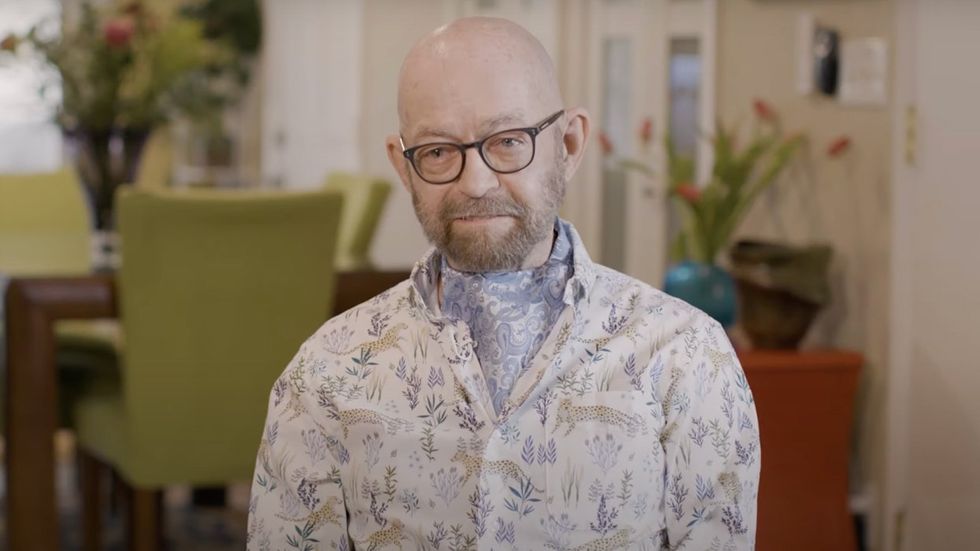
courtesy City of Hope/YouTube
courtesy City of Hope/YouTube
Paul Edmonds, the fifth person to be cured via a stem cell transplant, recently opened up about his experience.
April 05 2023 8:58 PM EST
By continuing to use our site, you agree to our Privacy Policy and Terms of Use.

courtesy City of Hope/YouTube
Paul Edmonds, the fifth person to be cured via a stem cell transplant, recently opened up about his experience.
Paul Edmonds was 33 years old when he received his positive HIV diagnosis in September 1988.
“I remember how I felt inside when I heard,” said Edmonds in an exclusive interview with The Washington Post. “I felt my heart sink.”
At the time, he was among many of his friends who received the diagnosis, and having watched some of the closest people to him wither away, he assumed he’d be dead within a year or two.
Life, however, had different plans for Edmonds. His 40th birthday passed. Then his 50th, followed by his 60th.
Now at 67, he's completely HIV-free.
Things took a turn for the better for Edmonds in 2019 when he became one of just five people in the world to receive a successful stem cell transplant. The donor had a rare genetic mutation that makes the body resistant to HIV, which ultimately worked in his favor.
In 2021, Edmonds stopped taking all the medications he’d been on for half of his life at that point. He now lives in long-term remission from both HIV and leukemia.
Stem cell transplants, however, come with many risks, which makes the effective treatment used on Edmonds likely to remain extremely rare and be reserved for patients who have both HIV and cancer. That said, the knowledge gleaned from the successful stem cell transplants could unlock the secrets scientists need to find new treatments and vaccines.
For Edmonds and his husband, Arnie House, the first days of the HIV/AIDS crisis are ones that still feel too near.
Edmonds had kept the word of his sexuality to himself until 1976 when he was 21. After he came out, he was met with support from his parents. Once he received their blessing, he packed up his Atlanta, Georgia life in pursuit of San Francisco, where he “didn’t feel alone anymore.”
Then, in 1980, friends of his started coming down with “gay cancer,” a term he despised. He cried over obituaries, visited friends in hospitals, and attended funerals and “life celebrations” for the dead. After learning of his own diagnosis in 1988, he called his mother, who simply wept and said she’d pray for him.
“I let myself freak out,” he said. “I probably drank too much, though I did get that under control at some point.” He turned to marijuana to help him with his nausea and appetite, which also prevented severe weight loss.
He admits there are times he allowed himself to imagine his own death. “How could I not?”
He tried every treatment and medication available at the time, but felt great anger that the community as a whole wasn’t getting the help needed to fight the crisis. He met his husband, also HIV positive, in 1992, and the pair have largely taken care of each other ever since.
When Edmonds was diagnosed with leukemia in 2018, the subtle benefit was that doctors would be able to address both his leukemia and his HIV in their hunt for the donor. Had Edmonds only had HIV alone, the transplant would have been too dangerous. It had worked just four times before, starting in 2007 with Timothy Ray Brown, who was known as “the Berlin patient” at the time of his cure.
The transplant only took half an hour, and Edmonds passed the critical 100-day mark afterward, which is the period of time where most complications occur. He stopped taking his HIV medications during the first year of the coronavirus pandemic, breaking free on March 6, 2021.
As one of a handful of HIV survivors who have achieved long-term remission, Edmonds has the interest of researchers. While the stem cell transplant is unavailable to most patients, it still exposes a gap in HIV’s armor.
Jana K. Dickter, an associate clinical professor with City of Hope’s division of infectious diseases, said she’s tracking two studies with Edmonds. The first focuses on the reservoirs where HIV can hide from the immune system, and the other aims to determine whether the virus can reactivate now that Edmonds is off his HIV medications.
As of now, everything still looks great.
These days, Edmonds spends his time visiting people who are sick and elderly. He runs errands for them and provides companionship, using his story as a beacon of hope.
“I’m a grateful person,” he said. “Somehow, miraculously, I survived all of this.”
Watch the City of Hope's video featuring Edmonds's story below: